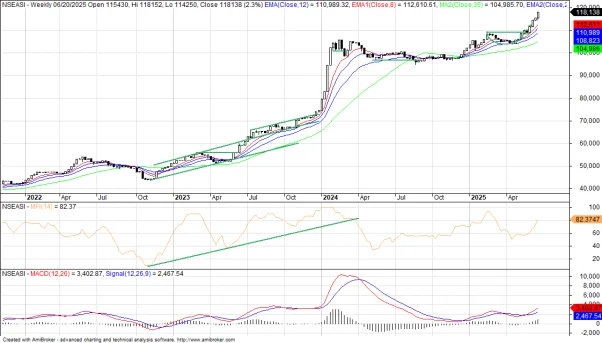In a week marked by a mix of optimism and caution across the continent’s financial landscape, key African stock markets closed on varying notes for the trading week ending Friday, July 11, 2025. From the bustling commercial hubs in West Africa to the economic engines of East, North, and Southern Africa, investors witnessed a blend of bullish advances and modest retreats — reflecting both local fundamentals and broader global influences.
In West Africa, Nigeria’s NGX All-Share Index showed resilience, recording a marginal gain of 0.8% week-on-week. The uptick was primarily driven by investor interest in tier-one banks, consumer goods, and energy stocks, which have seen renewed optimism following policy direction from the Central Bank of Nigeria (CBN) aimed at stabilising the naira and enhancing liquidity in the foreign exchange market. Analysts say the reforms, though still unfolding, are beginning to reflect in market sentiment.
Ghana’s GSE Composite Index, however, was less fortunate, sliding by 0.5% over the same period. Market watchers attribute the dip to profit-taking in select financial stocks and uncertainties surrounding fiscal policy adjustments as the government continues negotiations with international partners over its economic recovery programme.
Shifting to East Africa, the Nairobi Securities Exchange (NSE) posted a modest gain of 1.1%, supported by renewed foreign investor interest, particularly in the banking and telecom sectors. Safaricom shares, a major component of the NSE-20 index, led the rally following the announcement of strategic expansion into Ethiopia’s mobile money space. Market analysts believe the move could signal longer-term growth potential for Kenya’s equities market.
Meanwhile, Tanzania’s DSE remained relatively flat with minor fluctuations, reflecting a cautious approach by domestic investors amid ongoing tax reforms. Similarly, the Uganda Securities Exchange (USE) experienced subdued activity, closing the week nearly unchanged as traders awaited key economic data expected later in the month.
In North Africa, Egypt’s EGX30 recorded a 1.3% uptick as the market reacted positively to a rebound in tourism figures and renewed inflows into the real estate and construction sectors. Investors seem encouraged by signs of stabilisation in Egypt’s macroeconomic environment, with the Egyptian pound holding steady for a second consecutive week and inflation easing slightly in June.
Conversely, Morocco’s Casablanca Stock Exchange posted a mild decline of 0.6%, primarily weighed down by losses in industrial and insurance stocks. While foreign direct investment figures released midweek showed year-on-year growth, short-term investor sentiment remained cautious as inflationary concerns persist.
In Southern Africa, the Johannesburg Stock Exchange (JSE) was somewhat flat, closing the week with a negligible decline of 0.2%. Mining stocks, usually the lifeblood of the JSE, were mixed due to volatility in global commodity prices — particularly gold and platinum — as markets reacted to new data from the US Federal Reserve indicating interest rate uncertainties. South Africa’s ongoing power supply challenges also continued to weigh on business confidence.
Overall, the continental snapshot for the week paints a picture of a fragmented but active investment environment. While some markets benefited from sector-specific gains and macroeconomic stability, others faced headwinds ranging from policy ambiguity to investor caution. Market experts urge investors to maintain a diversified portfolio and monitor both local policy developments and international economic cues.
As Africa continues to position itself as a destination for long-term capital, the performance of its capital markets — such as seen this past week — offers a pulse check on investor confidence and the evolving economic narratives shaping each region.
